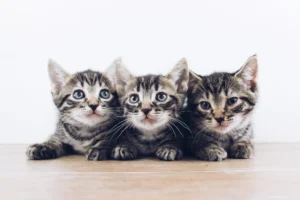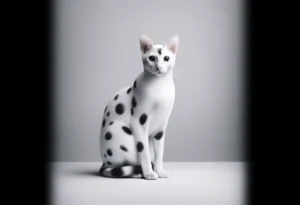Orange cats seem to have a reputation for being more vocal than other feline companions. But why is this the case?
Unique Vocalization Patterns
Orange cats are known for their unique vocalization patterns that set them apart from other feline friends. These vibrant kitties tend to be more chatty and expressive, often using a wide range of meows, purrs, and chirps to communicate with their human companions. One interesting theory suggests that orange cats may be more vocal due to their fiery personalities. Just like their bold coat colors, these cats may have a tendency to be more outgoing and vocal in seeking attention and expressing their needs.
Genetic Factors
Genetics play a significant role in determining why orange cats tend to be more vocal compared to cats of other colors. Research has shown that the gene responsible for the orange coloration in cats, known as the “orange” gene or the O gene, may also influence their vocal tendencies. This genetic factor could be linked to the same genes that govern their social and vocal behaviors, making orange cats more predisposed to being talkative and communicative.
- Additionally, studies have suggested that the breed of an orange cat can also influence their vocalization patterns. Certain breeds, such as the Abyssinian or Siamese, are naturally more vocal compared to others, which could contribute to the chattiness of orange cats in general.
Remember, each cat is unique, and while orange cats may have a tendency to be more vocal due to genetic factors, it’s essential to pay attention to your individual feline friend’s needs and preferences to better understand their communication style.
Personality Traits
Orange cats are known for their curious and outgoing nature, which can contribute to their chattiness. These cats tend to be social and affectionate, often seeking attention and interaction from their humans. Their vocalizations may serve as a way to communicate their needs and desires, whether it’s asking for food, playtime, or simply seeking companionship. Orange cats are also intelligent and independent, traits that may manifest in their tendency to vocalize to express themselves. If you have an orange cat, embrace their chatty nature and engage with them to strengthen your bond.
Environmental Influences
The environment in which orange cats are raised can have a significant impact on their vocalization habits. For example, if a cat grows up in a noisy and active household, they may become more vocal to compete for attention or communicate over the noise. Conversely, a quiet and peaceful environment may result in a less vocal cat. Providing your orange cat with plenty of stimulation, interaction, and affection can help satisfy their social needs and reduce excessive vocalization. Remember, every cat is unique, so pay attention to your furry friend’s behavior and adapt their environment accordingly to keep them happy and content.
Health considerations
Orange cats may be more vocal due to underlying health conditions. Just like humans, our feline friends can experience discomfort or pain that prompts them to meow more frequently. If your orange cat is suddenly more chatty than usual, it’s essential to rule out any health issues. Conditions such as dental problems, urinary tract infections, or digestive issues could be causing your cat to vocalize more. Schedule a visit to the vet to ensure your furry companion is healthy and happy.
Orange Cat Myths
Let’s debunk a common myth surrounding orange cats and their vocal tendencies. Despite popular belief, the color of a cat’s fur does not dictate its vocalization habits. While orange cats may seem more vocal to some owners, this behavior is not exclusive to cats with this particular coat color. Each cat has its unique personality, which influences how often they vocalize. So, next time you hear someone say that orange cats are always more talkative, you can confidently correct them with this newfound knowledge.
Communication Techniques
Orange cats are known to be more vocal than other cats, often using a variety of meows, purrs, and chirps to communicate with their humans. When your orange feline friend is meowing, pay attention to the pitch, tone, and volume. A high-pitched meow may indicate excitement or a request for attention, while a low, persistent meow could signal hunger or discomfort. Purring is a common form of communication for orange cats, often expressing contentment or seeking comfort. Chirping can indicate curiosity or excitement, especially when they see birds or insects.
Key Insight: When deciphering your orange cat’s vocalizations, remember to consider their body language and environment. This can provide valuable context and help you better understand what they are trying to convey.
Interactions with Humans
The vocal behavior of orange cats can be heavily influenced by their interactions with humans. Cats often learn to meow as a way to communicate with their human companions. If you respond to your cat’s meows by providing food, attention, or playtime, they may learn that meowing gets them what they want. It’s essential to respond to your orange cat’s communication cues in a consistent and appropriate manner to reinforce positive behavior.
When your orange cat meows, take the time to assess their needs and respond accordingly. Make sure to provide them with food, water, a clean litter box, and ample attention and playtime. By meeting their needs promptly, you can help prevent excessive vocalization and ensure a harmonious relationship with your feline friend.
Key Insight: Positive reinforcement, such as offering treats or petting when your orange cat meows appropriately, can help reinforce desirable behavior and reduce excessive vocalization over time.
Fun Facts About Orange Cats
Orange cats are not only adorable and cuddly but also possess some fascinating traits that set them apart from other feline friends. Did you know that orange cats tend to be more vocal compared to cats of other colors? It’s true! Their chattiness adds to their charm and makes them stand out in the feline world. Additionally, orange cats are more likely to be male, with only about 20% of orange cats being female. This unique characteristic adds to their allure and makes them even more special. So, if you have an orange cat at home, cherish their vocal nature and unique personality traits that make them truly one-of-a-kind.
Tips for Communication
Communicating effectively with your orange cat can strengthen your bond and ensure a harmonious relationship. When interacting with your vocal orange cat, pay attention to their vocal cues and body language. Cats communicate through meows, purrs, and other sounds, so listen carefully to understand what they’re trying to convey. Engage in interactive play sessions to communicate and bond with your orange cat, as this will help satisfy their need for mental and physical stimulation. Providing a consistent routine and creating a safe and comfortable environment will also help your orange cat feel secure and promote open communication. Remember, good communication is key to building a strong and loving relationship with your chatty feline companion.
Tips for Communication:
- Pay attention to vocal cues and body language
- Engage in interactive play sessions
- Maintain a consistent routine
- Create a safe and comfortable environment
- Listen carefully to understand your cat’s needs
Alex, a passionate animal lover, has experience in training and understanding animal behavior. As a proud pet parent to two dogs and three cats, he founded AnimalReport.net to share insights from animal experts and expand his knowledge of the animal kingdom.









